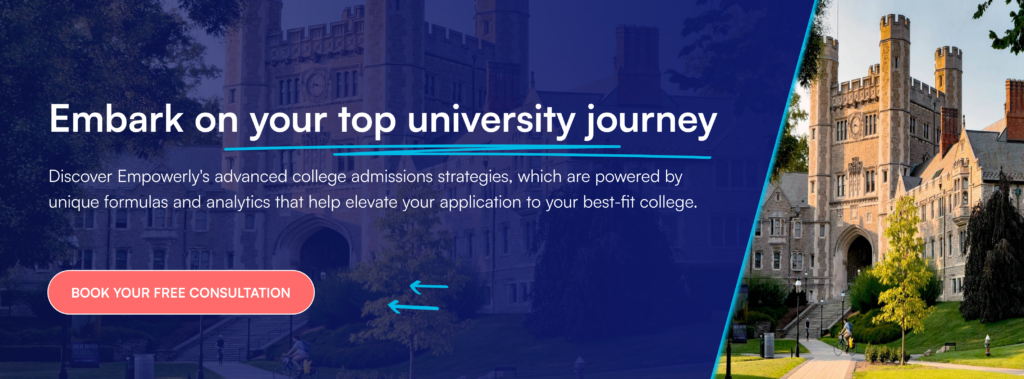As a high school junior with your sights set on senior year and graduation, it’s easy to get carried away in daydreams about what college life will be like. In only a year, you think, your real life can finally begin: a beautiful campus to call home, fascinating classes to study, lifelong friends, and the freedom to explore a new city…
But hold on — before you start scrolling college websites or visiting campuses in earnest, you need to make sure your foundation is solid. And there’s a distinct difference between daydreaming and goal-setting. Junior year is the perfect time to get serious about your college preparation, if you haven’t already. This preparation isn’t just about applications, but also getting ready for the bigger journey ahead of you.
Ready to buckle down and start the college research? Making the right moves to prepare now will pay off tenfold next year, and the sooner you start, the more opportunities you’re able to leverage. That’s just a smart investment in your future.
College prep for juniors
Starting from the very beginning? If you’re a high school junior and just starting to think about college, don’t freak out; even if you’re starting from scratch, it’s not too late. As a matter of fact, most students solidify their college lists in junior year.
The first step is to get clear on the essentials: strong academics, extracurricular focus, and a plan for how the next 12-18 months might unfold. This groundwork will support every decision you make later in the college search process. Think of this stage as setting the table before the meal — you can’t start sampling colleges until your preparation pieces are in place. But if you make the right choices now, you can be well on your way to catching up.
You don’t have to take our word for it; you can hear from a Former Admissions Officer, Connie, who shares a few quick tips for how juniors can get ready, and why these steps will decrease your stress and lead to a more successful college application process.

Here are our best tips for those just starting out.
1. Plan your “capstone” summer now.
One of the biggest preparation milestones? Planning the summer between junior and senior year. This isn’t just another vacation; it’s the most important summer of your high school career so far.
Try to find ways to get involved that mirror your natural interests, whether that’s dance, medicine, or reading.
For instance, great options include:
- Volunteering in your community
- Independent projects or research
- Academic summer programs
- Internships or shadowing experiences
- Leadership opportunities in clubs or organizations
The key is to start planning now, in the fall. Applications for selective summer programs often open in winter or early spring, and last-minute scrambling rarely works out well.
Here’s why this matters for college: summer activities can also spark ideas about the types of colleges you’ll want to consider later — programs that align with your interests can point you toward schools with strong departments in those areas.
2. Take care of standardized tests.
Another cornerstone of junior year preparation is standardized testing. Whether you take the SAT or ACT, it’s better to tackle these exams now so they don’t pile up on top of your senior-year responsibilities. A smart testing strategy includes practice tests, scheduling your first official exam, and planning for possible retakes.
Even though many colleges have gone test-optional, strong scores can still help you stand out or qualify for scholarships. Think of testing like clearing a hurdle — you’ll feel more confident moving into the college search once you know where you stand academically.
The takeaway: just like your summer planning, tests are part of the foundation. Finish them early, and you’ll free up valuable time for college visits, essays, and applications later on.
3. Start with a moment of reflection.
With your summer mapped out and testing on track, it’s time to pause and look inward. Personal reflection is the missing link that connects your preparation to the actual college search. Before you start building a list of schools, you need to know what kind of environment will allow you to thrive.
Ask yourself:
- How far do I want to be from home?
- Do I prefer a small, discussion-based classroom or a large lecture hall?
- What kind of activities or communities do I want to join?
- Do I want a bustling city campus or a quieter rural setting?
- Am I better suited for a semester calendar or a quarter system?
- What are my financial aid requirements?
- What is the university’s four-year graduation rate?
- Does this college offer mentorship or bridge programs?
- Are there affinity groups or supportive communities I can connect with?
Your honest answers to these questions will guide everything that comes next. Choose places where you can truly be happy, engaged, and successful — as your true self. Think of it this way: general preparation gives you the tools, but reflection points you in the right direction. With this bridge, you’re ready to leap into college research with confidence.
Download your copy of Empowerly’s 2025 Complete Student Checklist for juniors to make sure you don’t miss any important steps along the way.

Starting your college research
Ready to dive in? This is where all that preparation pays off: your summer plans, test scores, and personal reflections will help you build a college list that’s ambitious, balanced, and uniquely yours. But where should you actually start?
Online resources
The simplest starting point is your laptop or home computer. Once you’ve decided what you’re looking for, the Internet can become a great tool for exploring hundreds of colleges quickly.
Here’s how to make online research effective rather than overwhelming:
- Build a working list. Create a spreadsheet or Google Doc where you can track schools that interest you. Note key details like size, location, majors, and acceptance rates.
- Use reliable sites. University websites and trusted resources like NACAC can provide accurate information. Rankings can be a helpful reference, but don’t let them make your decisions for you.
- Organize your list by tiers. Aim for a mix of reach, match, and safety schools. Building a balanced list now ensures you won’t feel trapped later.
Want a pro tip? As you’re browsing, pay attention to programs and resources that align with your reflection answers. If you’re interested in undergraduate research, make note of schools with strong lab opportunities. If campus culture matters, look for student blogs or videos to see what life is really like.
College fairs or visits
Digital research is great, but nothing beats hearing directly from colleges themselves. Junior year is the prime time to start visiting campuses and attending fairs, both in person and virtually.
College fairs bring dozens (sometimes hundreds) of schools together in one place. This is your chance to talk with admissions reps, pick up brochures, and ask questions you can’t answer from a website alone. Virtual college fairs offer the same benefits without leaving home — and often include breakout sessions about financial aid or specific majors.
Campus visits are even more valuable. Walking through the student center, sitting in on a class, or grabbing lunch in the dining hall gives you a feel for the energy and culture. Even if you can’t travel far, consider visiting nearby colleges just to practice asking questions and observing campus life.
Talking with a counselor
Your high school counselor, or an independent college counselor, can be your ultimate guide in this process. Counselors often know of colleges you’ve never heard of, but fit your profile perfectly.
College counselors can also help you avoid some common pitfalls, like:
- Only considering colleges you know already
- Ignoring financial fit
- Letting others build your list for you
- Delaying prep until senior year
- Skipping reflection, going straight to rankings
There are all kinds of ways that an expert in this field can make your college application process easier and more enjoyable.
Here’s how to make the most of your counselor time:
- Come prepared. Share your GPA, test scores, and independent notes.
- Ask targeted questions. Doing some research beforehand will help.
- Be open to suggestions. Some of your best-fit schools may not even be on your radar yet.
Independent counselors, like those at Empowerly, provide even more personalized support and expand your horizons even further.

College research, and beyond
By combining smart preparation with intentional research, you’ll set yourself up for success in senior year. Junior year isn’t just a waiting game, or a warm-up period — it’s the secret turning point where your daydreams start to become your reality.
Let’s review: what should you do next?
- Solidify your summer plans.
- Get your testing strategy on track.
- Reflect honestly on your college priorities.
- Begin researching, visiting, and talking with counselors.
- Draft a balanced college list by year’s end.
Here’s another student’s perspective on how to stay organized (and focused) during the college research process as you start building your college list:
How do we know our approach works?
Other than the sheer numbers, we know it works because this strategic approach allows you to balance ambition with pragmatism, maximizing your chances of finding the right fit academically, socially, and financially. By casting a wide net and looking at schools of varying magnitude, you allow yourself to explore various possibilities and refine your choices as you gain more insight into your preferences and priorities.
The payoff: when application season arrives, you won’t be the one scrambling. You’ll be confident, focused, and ready to apply to colleges you love.
Our counselors are ready to help make sure your college list is strong, strategic, and personalized. Don’t wait; your future deserves nothing less.
